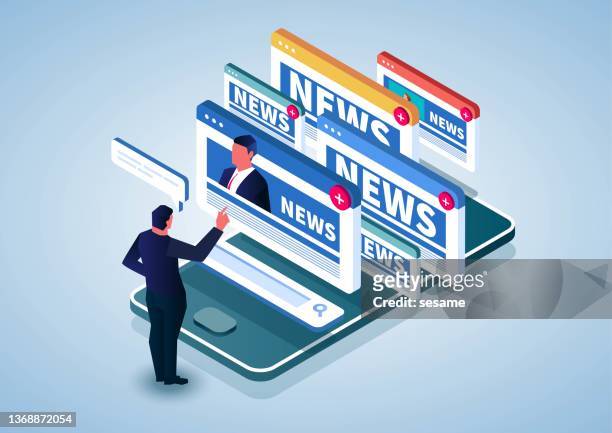The Importance of Fact-Checking worldwide of News Online
The occurrence of misinformation in today's on-line news landscape has actually reached startling levels. Fact-checking companies play a vital duty in neutralizing this trend. They confirm insurance claims and boost the integrity of journalism. The performance of these organizations commonly pivots on their methods and public understanding. As target markets navigate this complex environment, the implications of their findings may shape the future of news consumption and depend on. What does this mean for the stability of information relocating onward?

The Rise of Misinformation in the Digital Age
How has the advent of digital modern technology added to the spread of misinformation? The rapid growth of the net and social media platforms has actually helped with the dissemination of details at an extraordinary rate. Individuals can share short articles, videos, and point of views with a mere click, usually without confirming the material's precision. Algorithms focus on mind-blowing or psychologically billed material, causing a spreading of misleading stories that capture focus.
In addition, the privacy paid for by electronic platforms allows people to spread false information without accountability (stnews.live). Misinformation prospers in resemble chambers, where customers are revealed primarily to viewpoints that enhance their ideas, additionally setting frauds. The saturation of details can overwhelm customers, making it challenging to discern legitimate sources from unreliable ones. Consequently, false information has become a prevalent concern in the electronic landscape, influencing public viewpoint and trust in legit news sources
The Role of Fact-Checking Organizations
Fact-checking companies play an important function in boosting the integrity of journalism by confirming claims made in report. Their initiatives are essential in combating misinformation, making certain that precise information prevails in the electronic landscape. By holding media outlets accountable, these organizations contribute substantially to informed public discussion.
Enhancing Trustworthiness in Journalism
While false information proliferates in the electronic age, fact-checking organizations play an essential role in boosting the credibility of journalism. These organizations thoroughly validate claims made in news short articles, public declarations, and social media posts, making certain that information shared to the public is accurate and trustworthy. By providing independent evaluations, they serve as an important resource for journalists, helping them keep high requirements of stability. In enhancement, their efforts promote transparency in media, fostering public trust. As audiences come to be progressively discerning, the existence of credible fact-checking entities can distinguish trustworthy news resources from those that might spread frauds. Ultimately, the dedication of fact-checking companies to maintain truthfulness is important for the wellness of democratic discourse.
Combating False Information Effectively
As false information remains to spread out quickly throughout electronic systems, the role of fact-checking companies comes to be progressively vital in the battle for exact info. These organizations work as guard dogs, scrutinizing claims made by public figures and media electrical outlets to ensure accountability. By utilizing extensive research study methods and expert analysis, they validate facts and clarify misleading narratives. Their searchings for are disseminated through numerous networks, enlightening the public and fostering crucial thinking. On top of that, partnerships with social networks systems enhance their reach, permitting for punctual flagging of false details. As electronic literacy expands, the influence of fact-checking companies is necessary in encouraging audiences to recognize truth from fallacy, ultimately adding to a more educated culture.
How False Information Affects Public Perception
False information substantially undermines trust in media, leading audiences to wonder about the reputation of news resources. Consequently, individuals usually gravitate towards electrical outlets that strengthen their existing beliefs, adding to the polarization of opinions. This vibrant develops a fragmented info landscape, where shared recognizing comes to be progressively difficult to achieve.
Rely on Media

Rely on media has come to be increasingly breakable in the digital age, where the quick spread of incorrect information can alter public perception. As misinformation proliferates across social media and on the internet platforms, audiences typically find it testing to recognize trustworthy resources from unreliable ones. This unpredictability cultivates suspicion, leading many people to question the intentions behind news reporting. Depend on in established media outlets has actually lessened, as consumers increasingly transform to different sources that may do not have strenuous editorial standards. This disintegration of trust not just influences specific ideas however additionally undermines the cumulative capacity to involve in informed conversations. Inevitably, the integrity of journalism goes to stake, highlighting the essential demand for effective fact-checking to bring back self-confidence in the media landscape.

Polarization of Viewpoints
The boosting hesitation toward typical media has actually added to an expanding polarization of viewpoints amongst the general public. Misinformation, commonly shared with social networks and on the internet systems, plays a significant duty fit unique ideological separates. Individuals frequently seek details that aligns with their pre-existing ideas, enhancing their perspectives while rejecting opposing point of views. This resemble chamber result magnifies departments, bring about a fragmented public discourse where consensus comes to be increasingly elusive. Furthermore, sensationalized narratives grow in this setting, further skewing public understanding and cultivating mistrust in trustworthy resources. As polarization intensifies, the need for reliable fact-checking comes to be vital to link gaps and promote educated discussions, ultimately making sure a much more natural culture efficient in maneuvering complicated issues.
Strategies for Reliable Fact-Checking
Reliable fact-checking relies upon a systematic method that includes detailed study, verification of resources, and vital analysis of cases. A fundamental method is cross-referencing info from numerous trustworthy sources to verify its precision. Fact-checkers frequently utilize specialized databases and archives to trace the beginning of specific declarations, making certain that the reported info aligns with recorded evidence.
An additional necessary method includes inspecting the context in which claims are offered. Deceptive info can arise from out-of-context quotes or discerning information usage. By checking out the more comprehensive narrative, fact-checkers can determine potential prejudices or misinterpretations.
Engaging with professionals in appropriate areas can give clearness and insight that enhances the fact-checking procedure. This cooperation can reveal nuances that laypeople may forget - stnews.live. Ultimately, a regimented technique integrating these methods cultivates an extra informed public, boosting the dependability of information shared in the digital age
The Effect of Social Media on News Consumption
How has social media transformed the method individuals take in news? The introduction of platforms like Facebook, Twitter, and Instagram her explanation has significantly modified news intake patterns. News is now shared rapidly, allowing customers to accessibility real-time updates and engage with material through sort, shares, and remarks. This immediacy has actually cultivated a choice for bite-sized details, typically at the cost of comprehensive evaluation.
Furthermore, social networks enables personalized news feeds, where algorithms curate content based upon individual preferences, producing echo chambers that might limit direct exposure to diverse perspectives. The duty of standard news outlets has actually lessened as people progressively depend on peer recommendations and trending topics. As a result, the credibility of information is often jeopardized, as sensationalism can overshadow valid coverage. Generally, social media sites has improved news intake, stressing rate and personalization while challenging the requirements of journalistic stability.
Empowering Target Markets to Determine Trustworthy Resources

Additionally, checking out the authorship and organizational background of newspaper article can expose potential biases. Cross-referencing information across numerous trusted outlets additionally enhances the verification procedure. Utilizing electronic devices, such as internet browser extensions that rank the reliability of web sites, can likewise help in identifying trustworthy information. By actively engaging with these resources and cultivating an important state of mind, target markets can better outfit themselves to determine reliable news resources, eventually promoting an extra enlightened culture in the middle of the complexities these days's media atmosphere.
The Future of Journalism and Fact-Checking
As the media landscape evolves, the future of journalism and fact-checking deals with both tests and opportunities. The surge of electronic systems has equalized information circulation, permitting diverse voices to emerge. However, this has additionally brought about the spreading of misinformation, demanding durable fact-checking systems. Journalists will progressively count on modern technology, consisting of AI tools, to validate truths quickly and effectively.
Cooperation in between wire service and fact-checking entities is expected to strengthen credibility and transparency. In addition, target market engagement look at more info will play a vital function, as notified readers end up being substantial companions in recognizing reliable web content.
The need for responsibility and accuracy is most likely to expand, pressing journalists to promote high criteria in their reporting. Inevitably, the future of journalism might pivot on its capability to adjust to technological advancements while preserving journalistic stability, ensuring that fact-checking continues to be a foundation of trustworthy news.
Often Asked Concerns
How Can I Report False Information I Experience Online?
To report false information encountered online, individuals can make use of platform-specific reporting devices, provide clear proof, and share the details with fact-checking companies. Involving with neighborhood conversations can likewise aid elevate understanding about the misinformation.
What Prevail Indications of False Information in News Articles?
Common signs of false information in newspaper article include spectacular headings, lack of legitimate sources, emotional language, irregular facts, and lack of author qualifications. Readers should seriously evaluate content for these indicators to recognize accuracy.
Exactly How Do Fact-Checkers Verify Resources?
Fact-checkers confirm resources by cross-referencing details with credible data sources, seeking advice from professionals, and checking out the initial context of cases. They likewise assess the integrity of the sources, ensuring precise and reliable details for public consumption.
What Legal Actions Can Be Taken Against False information?
Legal actions versus false information might include disparagement legal actions, cease-and-desist orders, and regulative penalties. Sufferers can prosecute through civil courts, while some jurisdictions enforce penalties or assents on systems disseminating incorrect info.
Exist Apps for Fact-Checking News On-The-Go?
Many applications exist for fact-checking news on-the-go, including Snopes, FactCheck.org, and PolitiFact. These applications aid customers validate cases swiftly, advertising educated decision-making and promoting a much more critical strategy to consuming news in real-time.